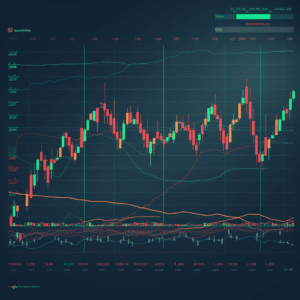Consumer discretionary stocks are from companies that sell products and services that customers can buy but are not strictly necessary.
It’s important to distinguish between necessities and luxuries when out shopping. One example of the latter is the discretionary spending sector of the economy.
It consists of things that people buy when they have a bit of disposable income left over, like vacations, meals out, and accessories.
Consumer discretionary stocks, in contrast to consumer staples stocks which produce essentials, perform better in times of economic growth and worse in times of economic contraction.
If you are interested in learning more about consumer discretionary stocks, read on!
If you want to invest as an expat or high-net-worth individual, you can email me (advice@adamfayed.com) or use these contact options.
What are Consumer Discretionary Stocks?
Two of the eleven sectors that make up the stock market according to the Global Industry Classification Standard are made up of retailers.
In the consumer staples industry, you’ll find businesses that provide basic “needs,” such as food and toiletries. Companies that cater to consumers’ desires are found in the discretionary sector of the economy.
equities in the consumer discretionary sector, also known as consumer cyclical equities, tend to rise and fall in tandem with fluctuations in household disposable income, as the economy grows and contracts.
Benefits of Investing in Consumer Discretionary Stocks

Consumer discretionary stocks can grow during economic growth because producers of non-essential goods and services may enjoy higher demand.
These cyclical stocks perform better in robust consumer markets. When the economy grows and people have more spare income, they spend more on discretionary things.
Consumer discretionary equities might reveal consumer trends like sustainable or digital product adoption.
The top consumer discretionary stocks may pay dividends and expand faster, giving investors a good return.
Risks of Investing in Consumer Discretionary Stocks
Before deciding to invest in consumer discretionary companies, it’s important to weigh the potential drawbacks of doing so.
Investors in stocks catering to discretionary spending stand to lose a lot if the economy or consumer habits shift.
Stocks in the discretionary spending sector can take a hit during economic downturns and periods of consumer spending restraint.
Losses from such downturns could materialize just as fast as any gains did.
Many businesses compete for a little slice of the discretionary consumer market. Investment growth and profit margins are both susceptible to competitive pressure.
What are the Best Consumer Discretionary Stocks
Nike
Nike has successfully achieved a prominent and influential position in the market for athletic footwear and clothing, using almost fifty years of continuous innovation to create sportswear that resonates with a wide range of consumers.
Nike’s business model derives its power from several key factors, including its continuous product innovation, robust marketing strategies, effective utilization of celebrity endorsements, and the strategic alignment of high-profile athletes’ achievements with the company’s products.
The corporation has a significant track record of surpassing the performance of the S&P 500 index.
Even in the aftermath of Michael Jordan’s departure from the professional basketball arena, Air Jordan shoes continue to serve as a prominent fixture within Nike’s commercial operations.
Nike currently holds a significant market share of sports footwear, estimated to be 39%.
This places Nike in a favourable position compared to its foreign competitors, namely Adidas and ASICS.
Nike, the multinational sportswear corporation, is strategically positioning itself to expand its presence in rapidly developing regions, notably China.
This concerted effort is expected to propel Nike’s future expansion to unprecedented heights.
The impact of COVID-19 on Nike’s commercial operations has been significant, with notable repercussions stemming from stringent regulations in China that have adversely influenced performance in the region.
However, it is worth noting that the epidemic has also expedited Nike’s transition into digital platforms and direct channels, a crucial component of the company’s overarching strategy.
Nike has successfully developed a robust digital ecosystem centred on applications like SNKRS and the Nike Training Club, effectively mitigating a significant portion of the adverse effects.
Despite the pandemic-induced economic downturn, the company has managed to generate substantial profits and has exhibited superior performance compared to competitors like Adidas and Under Armour (UAA -9.75%)(UA -8.47%).
Starbucks
The coffee industry significantly influences the morning routines of a substantial portion of the global population.
Through the introduction of the European café idea to the United States, Starbucks successfully capitalized on consumers’ inclination to indulge in reasonably priced indulgences.
Consequently, the brand’s high-quality beverages have garnered a devoted global following.
The company’s success may be observed by its comparable-store sales, which have consistently demonstrated a positive growth trend over time.
Despite seeing a significant decline in sales figures amidst the epidemic, Starbucks is currently witnessing a recovery in the United States.
Nonetheless, the company is encountering comparable obstacles to those experienced by Nike in the Chinese market, as its adherence to a zero-Covid policy has resulted in a decline in sales.
In September 2022, the company unveiled a strategic initiative known as the “reinvention plan” with the objective of achieving an annual comparable sales growth rate ranging from 7% to 9% and a net sales growth rate of 10% to 12% over the course of the next three years.
This plan entails allocating resources towards various areas such as enhancing employee engagement, optimizing store efficiency, implementing digital programs, expanding the Starbucks Rewards membership program, fostering product innovation, and establishing new store locations.
As of April 2022, the corporation possessed a global presence with a total of 34,948 establishments.
It anticipates a substantial expansion in its network, projecting to reach 55,000 locations by the year 2030.
This projection suggests a promising outlook for the company’s growth prospects, showing a notable abundance of potential for further development.
McDonald’s
McDonald’s has seen significant transformations since its peak in the mid-20th century, and the multinational fast-food corporation has diligently endeavoured to remain relevant in contemporary society.
The implementation of technological advancements, such as dynamic digital menus, automated ordering kiosks, online and mobile ordering functionalities, and delivery services, has significantly enhanced the accessibility of McDonald’s.
Simultaneously, the restaurant chain maintains a focus on providing value and fostering customer loyalty.
Additionally, the presence of drive-thrus has contributed to its resilience during the epidemic, surpassing the performance of other competitors.
Despite being a restaurant chain, this establishment exhibits several characteristics of a consumer staples company due to its strong emphasis on value.
In light of the universal want for sustenance, it is worth noting that McDonald’s offers a readily accessible and cost-effective option for individuals seeking a quick dining experience.

In addition, the corporation possesses a significant portion of the real estate on which its franchised restaurants are situated, enabling the collection of rental income while franchisees undertake the labour-intensive task of managing the restaurants.
Despite the dynamic nature of the restaurant industry, McDonald’s has managed to maintain its relevance and achieve robust growth figures in recent quarters, positioning itself as a successful player in the economic recovery.
Investors are also attracted to McDonald’s due to its unwavering commitment to distributing regular dividend payments.
The company has demonstrated a consistent pattern of increasing shareholder payments annually since the mid-1970s, earning the distinction of being recognized as a Dividend King.
McDonald’s exhibits a payout ratio of approximately 60% of its earnings, ensuring a sustainable capacity to uphold its dividend.
MGM Resorts International
The publicly traded company MGM Resorts International (NYSE:MGM) owns and runs a large number of casinos, hotels, and entertainment venues in both the United States and Macau.
Las Vegas Strip Resorts, Regional Operations, and MGM China are the company’s three operational arms.
MGM Resorts International (NYSE:MGM) owns and operates a wide variety of resorts that feature casinos, hotels, convention centres, restaurants, nightclubs, shopping centres, and other amenities.
MGM Resorts International (NYSE:MGM) reported fourth-quarter revenue of $3.59 billion, an increase of 17.3 percent year over year.
This number was $240 million higher than what was predicted by stock market experts. Among stocks in the discretionary spending category, this one is highly recommended.
MGM Resorts International (NYSE:MGM) was added to Barclays’ coverage on February 24 with an Overweight rating and a $59 price target from analyst Brandt Montour.
The analyst believes that the present valuation of MGM Resorts International (NYSE:MGM) accurately reflects the company’s status as a leading and diverse global gaming operator.
Possibilities for success include the company’s aim to repurchase shares at an enhanced pace in the near future, the robustness of the Las Vegas market, the continuous recovery of Macau, the presence of a fresh project pipeline, and other factors.
MGM Resorts International (NYSE:MGM) has a premium placement in the Las Vegas and U.S. regional markets, according to the analyst.
The number of hedge funds with a bullish perspective on MGM Resorts International (NYSE:MGM) fell in the fourth quarter, according to data compiled by Insider Monkey.
The number of bullish hedge funds fell from 53 to 48 throughout this time period. With 6.6 million shares at a $223.7 million valuation, Corvex Capital, headed by Keith Meister, has the largest ownership stake in the company.
TJX Companies
The TJX Companies, a prominent player in the off-price retail industry, has achieved notable success in the realm of apparel and home products.
This achievement can be attributed to their unique business model, which presents challenges for online replication.
The corporate entity overseeing TJ Maxx, Marshall’s, and Home Goods acquires brand-name products at reduced prices through various means such as close-out sales, manufacturing errors, and order cancellations.
Subsequently, said merchandise is retailed at discounts ranging from 20% to 60%.
The company has consistently achieved substantial profit margins and had robust growth throughout its operational history.
The company has formulated a strategic initiative to augment its global presence by increasing the number of stores to over 6,000, a significant rise from the current count of over 4,500.
Despite experiencing a downturn similar to other discretionary shops amidst the pandemic, TJX exhibited a remarkable recovery in the year 2021.
In 2022, apparel and home goods retailers are seeing challenges due to the redirection of consumer spending towards services.
However, TJX is optimistic about achieving moderate growth in comparable sales during the year.
The company has experienced a rise in year-to-date profits, a notable achievement considering the challenges faced by its industry counterparts in managing excessive inventory levels.
Airbnb, Inc.
Airbnb, Inc. (NASDAQ: ABNB) is a global network that connects owners with travellers looking for unique housing and experiences.
The company takes a marketplace strategy to link hosts and guests, enabling the latter to reserve the former’s services via desktop or mobile apps.
Revenue for the fourth quarter came in at $1.9 billion, while Airbnb, Inc. (NASDAQ:ABNB) reported a GAAP EPS of $0.48.
Both of these numbers are better than what Wall Street forecasters had predicted by a wide margin.
The company anticipates revenue between $1.75 billion and $1.82 billion for the first quarter of 2023, with a consensus estimate of $1.69 billion.
Argus upgraded Airbnb, Inc. (NASDAQ:ABNB) from a hold to a buy on February 28 and gave the stock a $144 price target.
The analyst predicts that Airbnb, Inc.’s (NASDAQ:ABNB) rental business will continue to see strong demand.
This is because the corporation is focusing on growing its presence in urban areas, where tourists tend to remain for longer periods of time.
Airbnb is also expected to benefit from the easing of COVID-19 restrictions in China, the growth of the economy in Latin America, and the early booking of summer vacations in Europe.
Earnings per share projections for fiscal years 2023 and 2024 have been updated by Argus. Both the original and new projections are higher than their predecessors, totalling $3.60 and $3.60, respectively.
Using data compiled by Insider Monkey, we can see that the number of hedge funds with long holdings in Airbnb, Inc. (NASDAQ:ABNB) fell to 54 in the fourth quarter from 58 in the third.
John Overdeck and David Siegel run the financial firm Two Sigma Advisors, which owns a sizable stake in the company, estimated at 2.85 million shares worth $244.5 million.
The Walt Disney Company
This widely recognized brand in the realm of family entertainment has consistently played a significant role in shaping American popular culture across multiple generations.
The company’s theme parks and animated movies enjoy widespread popularity throughout several regions.
Presently, the corporation possesses several entities like ABC, ESPN, Pixar, Marvel, and Star Wars, a controlling interest in Hulu, and an extensive assortment of assets procured from Fox through a transaction in 2019.
Disney possesses several competitive advantages, notably an unparalleled collection of intellectual assets and a corporate framework that facilitates the diversification of blockbuster films like Frozen into various revenue streams, encompassing theme park attractions, merchandise, consumer goods, and even live performances.
The pandemic had a significant impact on various aspects of the company’s operations.
The theme parks experienced closures or operated with restricted capacity, movie theatres ceased operations, and live sports events were suspended for an extended period.
Nevertheless, the organization has achieved notable success with its streaming platform, Disney+, which was introduced in 2019 and currently boasts a member base exceeding 100 million individuals.
Disney has implemented a reorganization of its entertainment enterprise, with the intention of positioning Disney+ as its focal point.
However, investors have recently expressed apprehension regarding the deceleration of development within the streaming sector, particularly in light of Netflix’s unexpected setback.
Given the ongoing reopening of the economy, it appears that Disney is well-positioned to emerge as one of the beneficiaries in the process of economic recovery.
The corporation has announced a notable increase in its financial gains within the parks and resorts division, potentially leading to a record-breaking number of visitors as a result of accumulated consumer interest.
Las Vegas Sands Corp
Las Vegas Sands Corp. (NYSE:LVS) and its subsidiaries are in charge of developing, owning, and operating integrated resorts in both Singapore and Macau.
These resorts have a wide variety of amenities, including hotels, casinos, shows, shops, convention centres, restaurants, and other tourist destinations.

Las Vegas Sands Corp. (NYSE:LVS) has had its price target raised by Jefferies analyst David Katz, from $64 to $66. Katz also reaffirmed a Buy rating on the stock.
The company has expressed increased confidence in Las Vegas Sands Corp.’s (NYSE:LVS) recovery and capital expenditures after seeing properties and meeting with management in Macau and Singapore.
As a result of the changing trends in Macau and updated predictions for Marina Bay Sands, Jefferies has altered its valuation multiple.
The number of hedge funds with a bullish outlook on Las Vegas Sands Corp. (NYSE:LVS) increased in the fourth quarter, according to data compiled by Insider Monkey.
In particular, the number of optimistic hedge funds increased from 48 to 57 during the year in question. Dmitry Balyasny’s Balyasny Asset Management owns a sizable piece of the business, with 2.05 million shares worth $98.7 million.
Investors in the consumer discretionary sector would do well to keep an eye on Las Vegas Sands Corp. (NYSE:LVS), Starbucks Corporation (NASDAQ:SBUX), Booking Holdings Inc. (NASDAQ:BKNG), and McDonald’s Corporation (NYSE:MCD), among others.
Final Thoughts
Investors seeking exposure to consumer discretionary stocks may consider allocating their funds to the best consumer discretionary ETFs and best financial ETFs through private banking or diversified investment funds, while also balancing their portfolio with the stability of the best consumer staples ETFs for a well-rounded investment strategy.
Trading in individual consumer discretionary stocks has the potential to outperform market indices like the S&P 500, but it also carries with it significant risks and disadvantages.
It can be time-consuming and expensive to research and make an informed decision about multiple separate stocks. They can also be highly tense.
For this reason, several financial experts advise putting no more than 10% of your portfolio into any one stock.
Pained by financial indecision? Want to invest with Adam?

Adam is an internationally recognised author on financial matters, with over 760.2 million answer views on Quora.com, a widely sold book on Amazon, and a contributor on Forbes.



